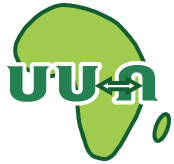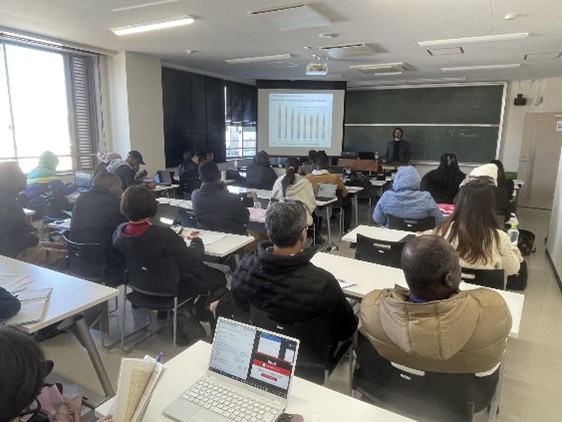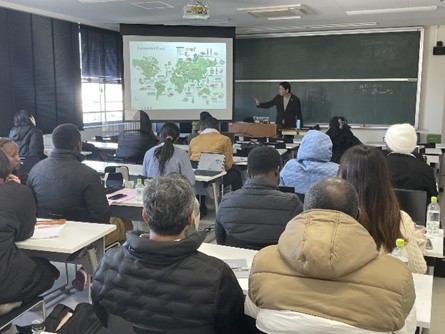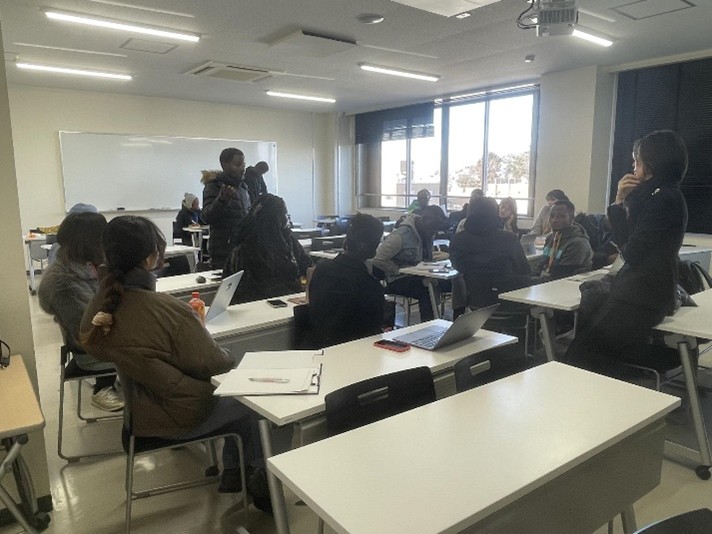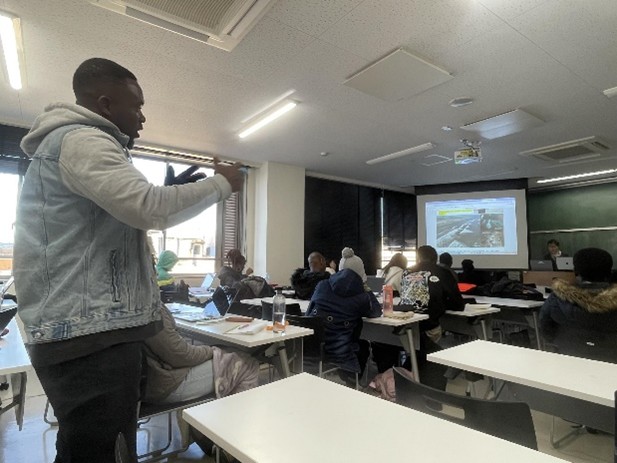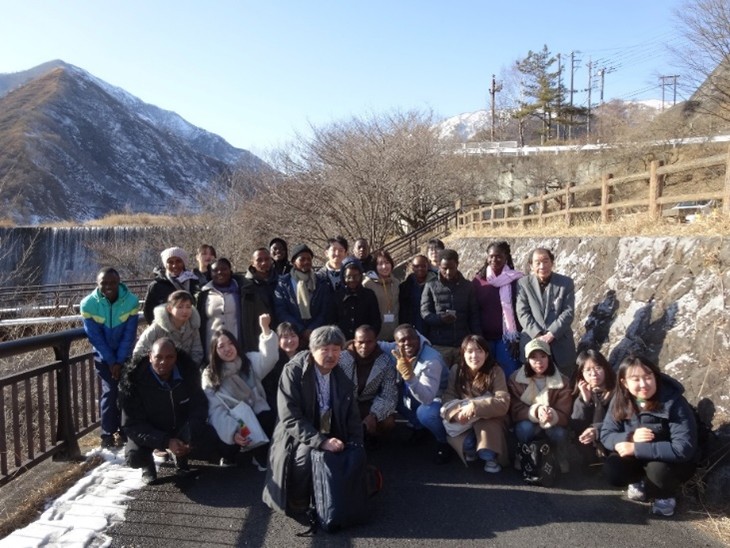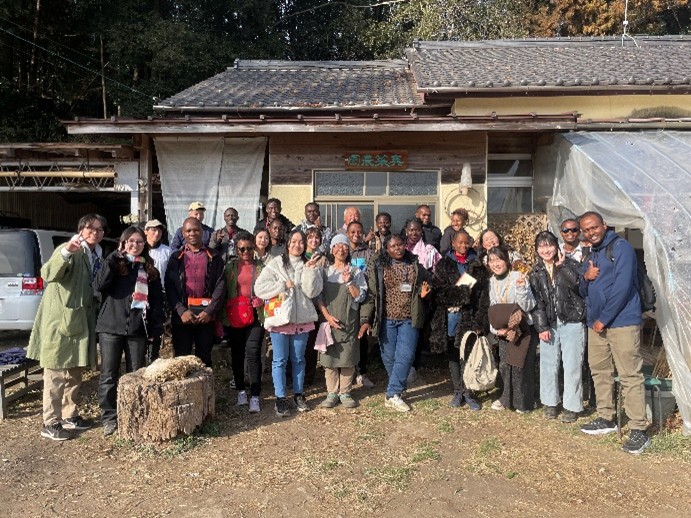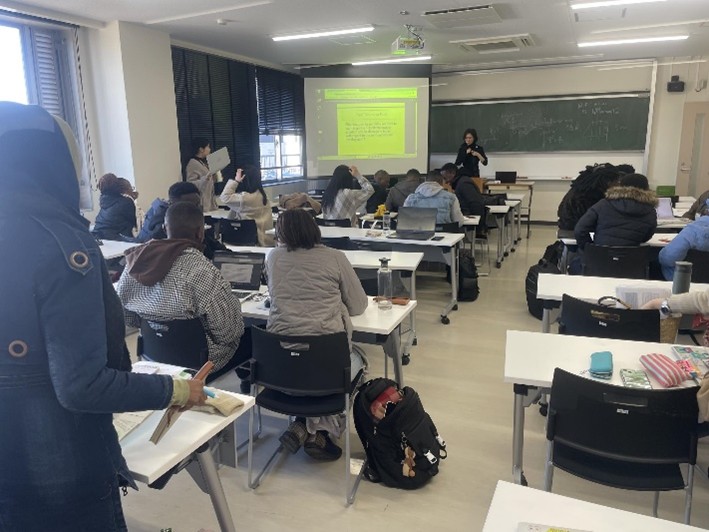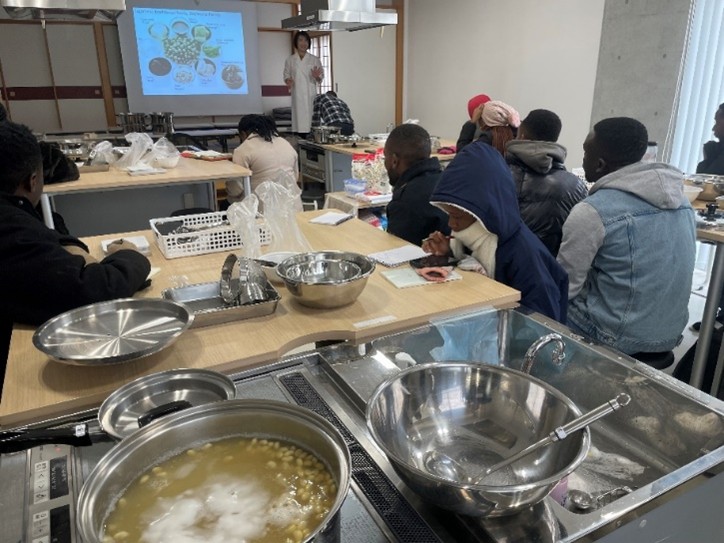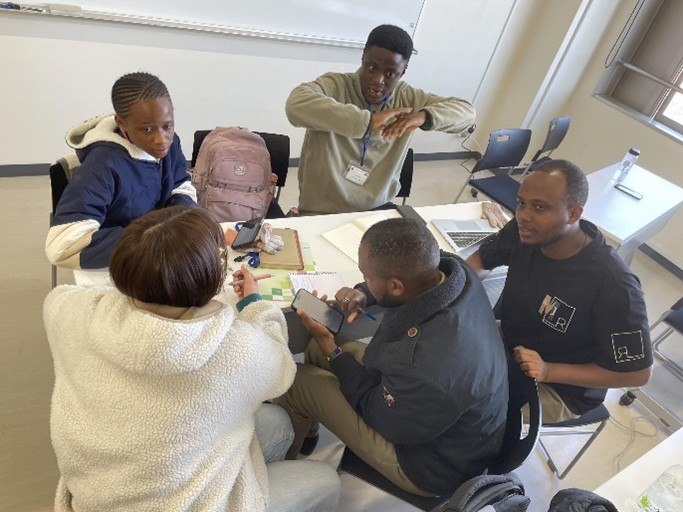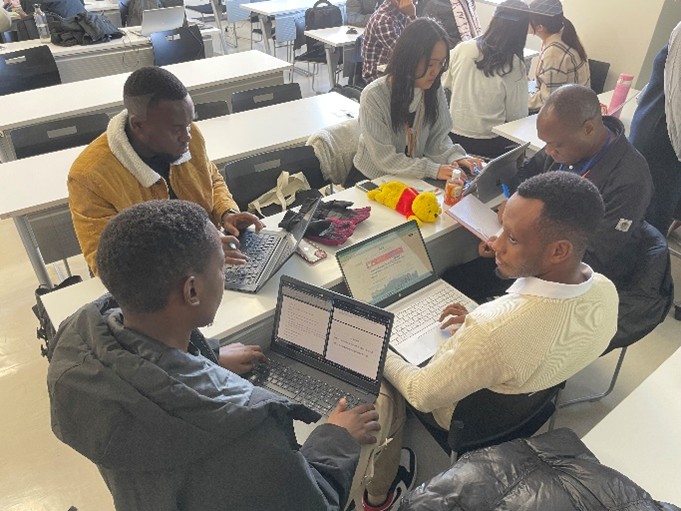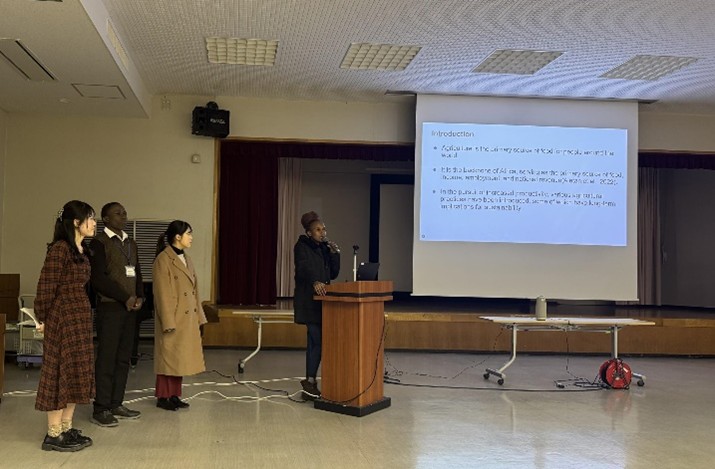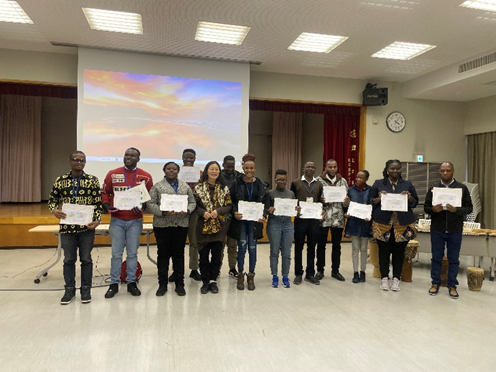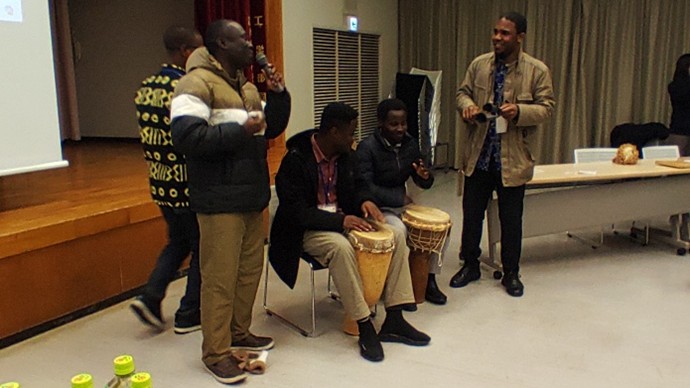“Environment, Food and Africa in the 21st Century: Learning from Japan’s development Experience and Ingenuity”
This program was selected for the Sakura Science Exchange Program (https://ssp.jst.go.jp/en/) offered by the National Science and Technology Agency (JST). Four students from University of Dar es Salaam, Tanzania, 3 students and 1 faculty member from Nelson Mandela African Institute of Science (NM-AIST) and Technology, Tanzania, 3 students and 1 faculty member from Ghana University were invited to Japan in February 12-21, 2025. Invited students were selected for UU-A “Global Management 2024” with outstanding results.
The students were joined with 5 students registered to the Global AL Seminar II, at the School of International Studies, Utsunomiya University and 5 TAs from Utsunomiya University (3 from Japan, 1 from Ghana, and 1 from Sri Lanka), and UU-A long term students from Ethiopia and Ghana to enable exchange of ideas between different countries and areas including Japan and Africa.
The schedule was as follows:
Feb. 11 (Tue): Departure from Tanzania and Ghana
Feb. 12 (Wed): Arrival at Narita Airport
Feb. 13 (Thu) AM: Orientation and introduction of Utsunomiya University
Self-introduction in groups pre-made group in consideration to diverse nationalities/universities and common interests
PM: Lecture “Current Situation and Issues of Japanese Agriculture: From Production to Consumption of Tea” (Prof. SUGITA Naoki)
Lunch meeting with University of Dar es Salaam students and faculty members (Prof. SAKAMOTO Kumiko)
PM: Lecture “Mining in Africa: The Ashio Mine Poisoning Case (Prof. SHIGETA Yasuhiro, Dr. SAGISAKA Hiroe)
Lecture “Japan’s Approach to Environmental Issues: From Pollution to Recycling and Carbon Neutrality” (Prof. TAKAHASHI Wakana)
Student Summit 2025 Opening Ceremony
Access the website of ‘Student Summit 2025’ anytime on February 14-20, and participate in Q&A sessions with the presenters in chat format
15 (Sat): Visit Ashio Copper Mine, a historical mining site in Japan to think about mining in Africa (Prof. Takahashi, Prof. Shigeta, Dr. Sagisaka)
Copper Mine Tourist facility
Lecture “Ashio Copper Mine Mining Pollution” (Mr. OINUMA)
Seeing the smelter site
Visiting the Ashio Dam
**Their visit to Ashio was highlighted in the Shimotsuke Newspaper on Feb. 22, 2025, p.26
16 (Sun) AM: Access the website of ‘Student Summit 2025’ and participate in Q&A sessions with the presenters in chat format
Lunch meeting with Ghana University student and faculty member (Prof. Sakamoto)
PM: Involvement of local actors, visits to organic farmers with ties to Africa and lectures by local instructors (Sousai Farm: Ms. ONODERA Sachie and Mr. ONODERA Tetsu, Rainveil: Mr. TAKANO Yu) (with Prof. Sakamoto)
Lunch meeting with NM-AIST and Addis Ababa University students and faculty members (Prof. Sakamoto)
PM: Observation of a community-wide organic composting project (Donkame) in Tochigi Prefecture involving local stakeholders and a lecture by a local lecturer (Mr. Yukio Kokubo, Donkame) (with Prof. Sakamoto and Prof. Mima Nishiyama)
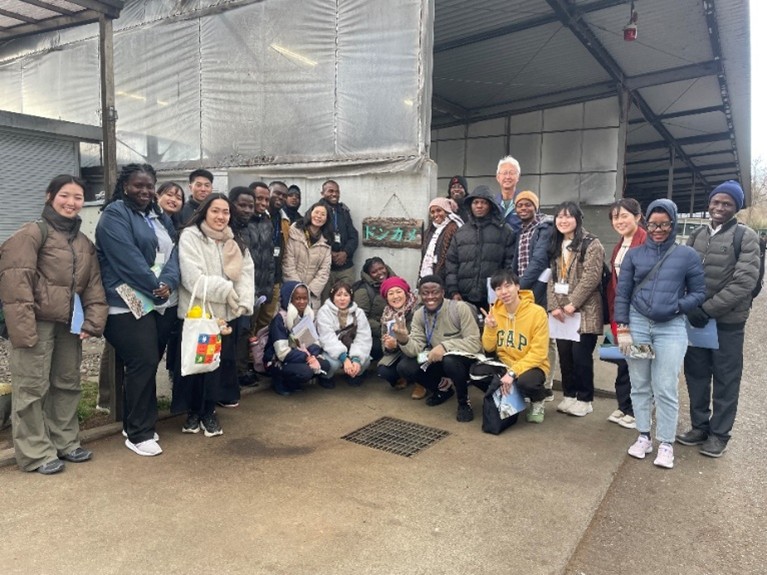
Student Summit 2025 Symposium I
18 (Tue) AM: Lecture and Workshop “Functional Foods and Their Processing from the Perspective of Traditional Japanese Foods” (Prof. OMORI Reiko) (with Prof. Sakamoto)
Lecture on fermented foods, and workshop on processing of fermented soybeans and Udon making
PM:Miso-making (continued)
Student Summit 2025 Symposium II
*Submission of individual reports on C-Learning
19 (Wed) AM: Sharing individual reports per groups, and select highlights for group presentations on lessons learned from the Japanese experience, and how it can be used for development in Africa (Prof. Sakamoto)
PM: Discussions and preparation for group presentations (Prof. Sakamoto)
Student Summit 2025 Symposium III
Submit group presentations on C-Learning (1st)
Feb. 20 (Thu) AM: Rehearsal and fine tuning of public presentation on lessons learned from the Japanese experience, and how it can be used for development in Africa. Group presentation revision and submission of final group presentation
PM: Public group presentation of results “Development of Africa from Japan’s Experience and Environment and Food in the 21st Century” indicated how participants learned from the lectures, workshops, and fieldtrips about the Japanese experience, and presented how it can be utilized for development in Africa.
21 (Fri): Visit to Miraikan (National Museum of Emerging Science and Innovation). Depart from Narita Airport
Arrival at the respective countries
***
All students were able to learn from the Japanese experience and also to have exchange of ideas with Japanese students, according to the evaluation of the course by the students:
Following are some comments provided by the participating students:
- It has been a very impactful experience for me as an individual in terms of the Japanese culture and the people, and it has cleared my perception about the people of Japan. With no fear, I can confidently consider Japan as my second home based on how the citizenry accepted me. It is my wish that I will come back for my PHD when I get the opportunity, and I also wish that this exchange program continue to bring more African students to come experience such beautiful culture and people.
- The course was very interesting and intensive and expecting to implement it fully in Africa.
- Throughout the program we had not faced any sort of racism despite differences in colour, ethnicity and language. We were treated with utmost respect and valued. Most of us wish to continue being part of the Utsunomiya University, and I hope the doors will still be open for further collaborations such as researches and projects.
- I want to sincerely appreciate the great work you have done, the program is excellent and I have learnt a lot for application. Looking forward to pursue my PhD in Japan.
